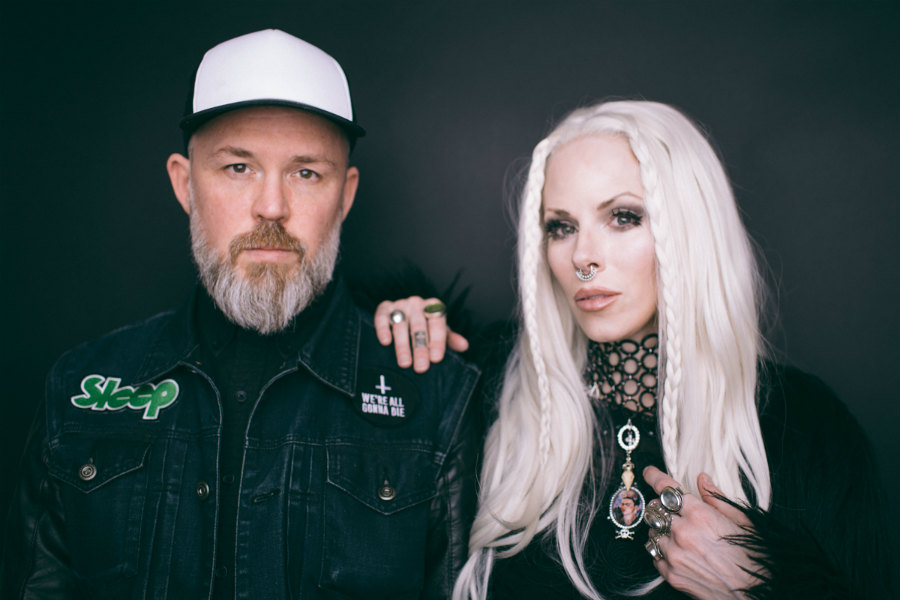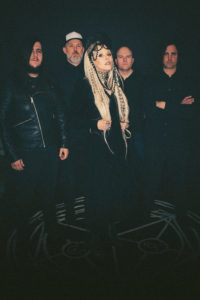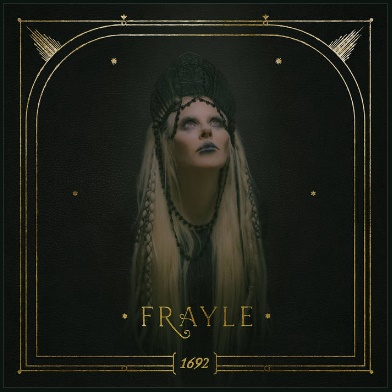Within its short 3-year lifespan, Ohio’s atmospheric metal duo (now turned quintet) FRAYLE has birthed 2 EPs featuring its heady blend of ethereal vocals and towering riffs/rhythms, culminating now in the recently-released debut full-length, 1692.
Lord Randall sat down with founding members Gwyn Strang and Sean Bilovecky to time travel back to 1692, and discuss how, though much has changed, much remains the same.

BY CHOICE, NOT BLOOD
Interview with Gwyn Strang and Sean Bilovecky of FRAYLE
Interview By: Lord Randall
Rebel Extravaganza: Back in 2017 when FRAYLE was birthed, did you already have a plan in mind – an image or sonic palette you knew you wanted to draw from, or was it more “Let’s see what happens if…”?
Gwyn: Image wise, not really. As we progress, I’m really having fun stretching the visual ideas and making sure whatever story we’re telling can be seen as well as heard.
Sean: The first songs we wrote were heavy, but I think we have both broadened and deepened our understanding of what heavy means to us. For me the definition of heavy has grown beyond just being louder or slower. It’s about tone and groove, and how those tones within a groove relate to Gwyn’s voice.
RX: These days it seems the whole “female front woman” thing has been done to death, most recently starting with the “occult rock” boom where every band needed its wannabe Stevie Nicks, Dorthia Cottrell or Jinx Dawson, the “Witchy Woman” trope. From the start, FRAYLE has reminded me more of Bismuth (talking about nowadays), Cocteau Twins, Black Box Recorder, Starflyer59 and Lush than anything else. What/who were some of your initial influences, and have you made a conscious effort to move “past” them as FRAYLE has grown? Do you even really see a need to?
G: My vocal influences have always leaned more to the Cranes, Portishead, that kind of thing. It’s really important to me to show vulnerability through my lyrics and my voice. For me, the juxtaposition of that and the music is what makes us, us.
Having said that, I’m still open to change. I don’t think that will ever go away completely, but maybe throwing in different styles occasionally can make for a welcome change.
S: For me this is the most exciting aspect of what FRAYLE is doing. To me this means that making this type of music will never get old, and never get boring.

RX: In the promotional stills, the band seems to be a duo but, reading further, FRAYLE is an entire, 5-piece band. Knowing how duos (Darsombra, Black Cobra, Sunn0))), Bismuth) carry over lately, how much of a democracy is FRAYLE, and would you consider it more a true band or a project?
G: Thus far, Sean and I have written everything. Moving forward, we’re eager to get everyone’s input.
S: All of my previous bands were a democracy with someone in a “soft leadership” role that would sometimes have final say if there were split decisions. I would like FRAYLE to evolve into something like that for the next record. Our band is made up of very talented musicians, and Gwyn and I are looking forward to their input moving forward.
RX: One thing that came across in my initial listening to 1692 is the almost spiritual devotion to the dynamic – the need for peaks and valleys, shadow and shine. Was this something you felt was missing from past musical projects you’d been involved in, and, with so very (very) many post-this/post-that bands of late, what do you feel should make FRAYLE stand out?

S: Most of our songs (musically) are written quickly. If I think a mood is being conveyed, or a level of heaviness has been achieved, I try not to overthink it. If I do get stuck, and then force an arrangement or a new part, the end result usually isn’t as good as the songs that came quickly. I would say that 1692 is the result of trying to use only the songs that came quickest and felt the most precise. Each of us have our favorite songs on the record, but as a whole we tried to only let the best songs on the record.
Peaks and valleys, playing with dynamics, layered guitars, etc. These are all things that are now coming naturally and quickly to us. Hopefully this will continue as we keep moving forward with our writing.
I think our quest for tone layered with Gwyn’s voice really helps FRAYLE to stand out. Gwyn doesn’t sing the blues. It’s hard to classify her approach to melody… And to me this a good thing.
RX: If you can, delve a bit into the lyrical inspiration for ‘Gods Of No Faith’ and ‘If You Stay’.
G: ‘Gods Of No Faith’ is me saying “You are a god! Go out and do godly things! Think positive and positive things will happen. You create your own destiny!” When I subscribed to this manner of thinking many years ago, my life changed for the better in so many ways.
‘If You Stay’ is kind of the opposite of that. FRAYLE has always been a space for me to exorcise my demons. It is me at my most vulnerable. I’m feeling lost and alone, and then I get angry about it…
I forget who it was that said: “It’s okay to visit, just don’t live there.” about depression. What that means to me is that you must honor your feelings. You must go through it to get past it, but don’t dwell or ruminate.
RX; Do you feel that your surroundings in the Rust Belt of America (I moved to Tennessee from Detroit, so well familiar with urban decay) contribute at all the art of FRAYLE? Would this be the same band if, say, you were in Nebraska? Also, there’s a beauty in the skeletons of abandoned factories, as there is in sadness/psychosis in all parts of human life as well. We’ve all seen the weeds growing through asphalt, as it were.
G: I think we both think that beauty is more beautiful when a little dirty or decaying. To me, perfection is really boring. I want to be surrounded by things that are a little “off.”
I grew up in rural Canada. Everything is very far away there. As teens, we all saw ourselves as artists, so we would actually go searching for that decay by driving long distances to find abandoned buildings or fallen bridges. We would spend a day, take photos, and just explore everything.
S: Oddly I have become so used to the abandoned buildings/factories that it’s normal to me now. I’m more inspired by “big nature” like mountains, sky, etc. So for me it’s more like a native creature of urban decay calling out to the mountains. Heavy riffs sound more like mountains to me than man-made building.
RX: What was your recording setup like for 1692?
S: As I mentioned, we are fortunate to have a professional recording studio on the top floor of our home that is always on. My guitar rigs are set up in a way that I’m writing with my recording tone and if I like something, I press record, and it can be on the record if I still like it tomorrow. Gwyn has a recording mic that is always set up for whenever she wants to sing. Technology allows us to record our parts in our homes and then just email me the files. We mixed and mastered 1692 in our studio which we call “The Tower”. Carrying Orange amps up 3 flights of stairs sure is a pain in the ass though…
RX: Cleveland has long been a bastion of hardcore and, over the past 2 decades or so, dirt-rock doom ala Fistula/Rue/Fister/Ultralord. Seems FRAYLE would be the “odd band out” in a good many bills. Have you found your different take on heaviness/extremity to actually be a benefit?
Is there one show/tour where you were surprised to have won over a crowd?
G: I’m not sure if it’s a benefit, but it definitely helps us to stand out from the crowd.
S: We have to “earn” our shows and our audiences. My old band Disengage (Man’s Ruin) was a band that thrived in the environment you mentioned. Fast, loud, aggressive, and pretty drunk. Frayle is the opposite. We have to earn the respect of our crowds by putting on the best performance that we can
RX: Plans for the remainder of the year?
S: We invested in a cinema camera, and are focusing on putting out as much video content as possible to accompany the songs. We’re also hoping to hit the road and tour. Yo Windhand! Hit us up. We’re ready!